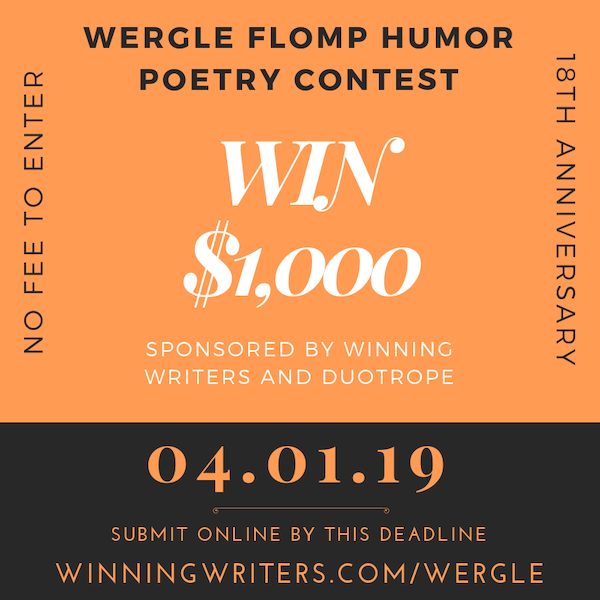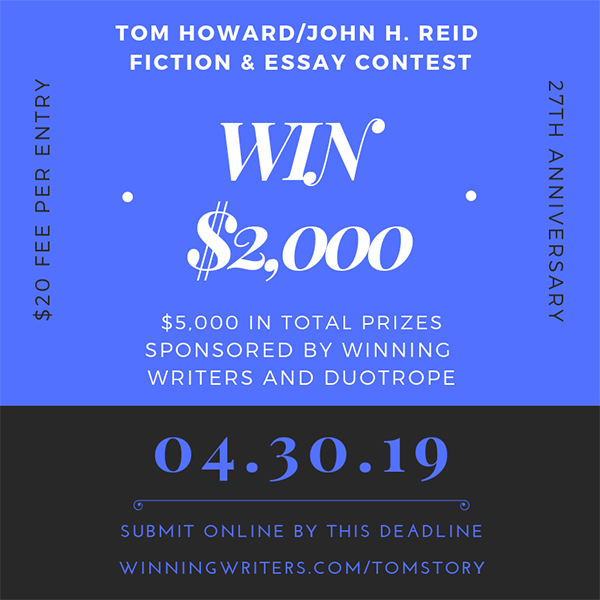
Don't miss these contests. All have cash prizes. At FanStory you can enter all these contests with upgraded membership ($9.95 per month or less). Every week enter a new contest with a cash prize. Find out more.
Flash Fiction Contest
Write a story (on any topic) using exactly 150 words. The title does not count towards the word count. Cash prize to the winner.
Deadline: Mar 15 (tonight!)
3 Line Poetry Contest
Write a poem with five syllables in the first line, seven syllables in the second line, and five syllables in the final line. The subject matter is open. This contest has a cash prize. Deadline: Mar 17 (two days!)
Love Poem Contest
All forms of poetry accepted. Your love poem can be fictional or non-fictional. It can be humorous or serious. The choice is yours. But it must clearly be a love poem. Cash prize to the winner. Deadline: Mar 20
Loop Poetry Contest
Loop Poetry requires that the last word of each line becomes the first word of the next line. So the last word of line 1 becomes the first word of line 2, last word of line 2 becomes the first word of line 3—and so on. Use a rhyme scheme of ABCB. Cash prize for the winning entry. Deadline: Mar 24
One Line Poem Contest
Write a monostich, a poem with just one line (and a title). Cash prize to the winner. Deadline: Mar 30
These are just a few of our contests. View the listing.
|
Congratulations to Joanie Holzer Schirm, Katie Bickham, Anne Sweazy-Kulju, Richard Eric Johnson (featured poem: "Old Graveyard"), Karin Aurino, Jill C. Baker, Madeleine McDonald, Konstantin Rega, Yvonne Chism-Peace, Robert Ronnow, R.T. Castleberry, Christina Wilson, and Gary Beck.
Winning Writers editor Jendi Reiter's prose-poem "Year of the Rat" placed among the top 20 finalists for the 2018 Robert J. DeMott Short Prose Contest from Quarter After Eight. The 2019 contest, with a prize of $1,008.15, will open on November 1. In other news, Jendi's poetry suite "Unnamed: Three Ghazals" was accepted for publication by White Wall Review, the literary journal of Ryerson University.
Learn about our subscribers' achievements and see links to samples of their work.
Have news? Please email it to jendi@winningwriters.com.
|
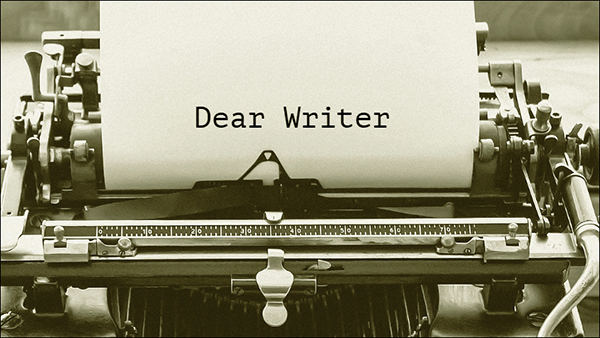
The Writer's Hotel NYC "Mini MFA" hybrid writers conference deadline is 3/22. Classes are filling up! Apply today to save your spot.
Our one-of-a-kind program includes a pre-conference critique of a full-length manuscript by two TWH Editors. We make hundreds of comments and follow up with a phone consult. Then we meet in NYC for our week-long conference.
On-site in NYC June 5-11: Workshops, lectures, agent pitch meetings—and writers have the extraordinary opportunity to read their own work in the city at KGB Bar, KGB Bar's Red Room, or Bowery Poetry Club. Writers experience NYC's awe-inspiring literary backdrop and bring their work to market at the heart of the publishing industry. Many attendees have secured agents and publishing deals.
2019 Faculty includes Former US Poet Laureate Juan Felipe Herrera, Meghan Daum, Mark Doty, Rick Moody, Jeffrey Ford, Elizabeth Hand, Cornelius Eady, Rob Spillman, and Tina Chang. Join us!
|
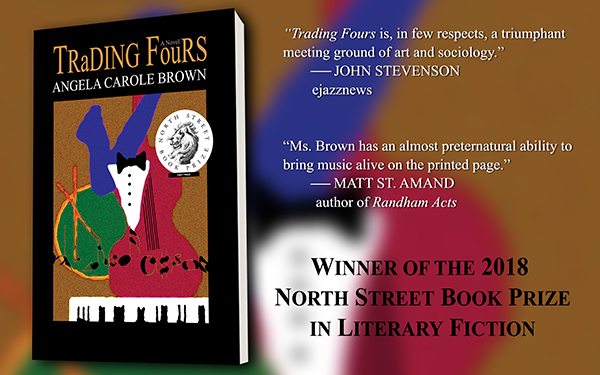
TRISTAN BAYLOR, SETH ROBB, CHLOE BAPTISTE and NICK BRANDT are struggling Los Angeles musicians, doing the "casual" circuit (weddings, bar mitzvahs, et al.) and who are, on the day in question, faced with plights that each struggles to resolve. These are imperfect people. They have their hubris and their vanities, their pains, fears, and pettiness. They are haunted by failed loves, failing relationships, and addictions. TRADING FOURS is an exploration into a special world that most do not know exists after the champagne is popped, the cake is cut, and the bouquet is thrown. By the end of the business day, these musicians' lives will have intersected in ways much like the dance of trading fours in music builds to a dramatic climax.
Read an excerpt and the North Street critique.
Buy now at Amazon.
|
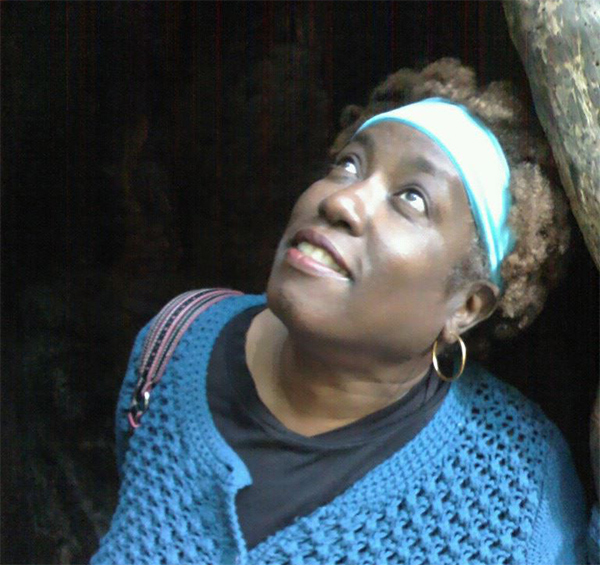
Deadline: March 31
This year's COG Page to Screen Awards final judge is award-winning YA legend April Sinclair, whose debut novel Coffee Will Make You Black was named Book of the Year (Young Adult Fiction) by the American Library Association, received the Carl Sandburg Award, and established Sinclair as one of the first author-activists to amplify the voices of urban teens. Accordingly, Sinclair was voted the #43 Favorite Author of the 20th Century.
Gunning to be voted into the ranks of America's favorite authors of the 21st century? Plenty of decades to go...but it starts with getting your work out there, and the COG Page to Screen Awards offer one writer the opportunity to see their work adapted for the screen.
Submit unpublished short stories and creative nonfiction pieces no longer than 7,000 words. Entry fee: $17.
Winner receives:
-
$1,000 prize
-
Publication online and in the print issue of COG
-
A blurb about your short story by April Sinclair
-
Your story adapted as an animated short film, 2D animation, graphic book/ebook, or series of interpretive illustrations by students in the celebrated Digital Art & Animation Program and Audio & Music Technology Program at Cogswell College
-
Results will be announced in May 2019.
Check out COG's adaptations of prior literary competition winners—including Megan Merchant's Lullaby, selected by 2017 US Poet Laureate and 2017 COG Poetry Awards final judge Juan Felipe Herrera.
Submit to COG's Page to Screen Awards at Submittable.
|
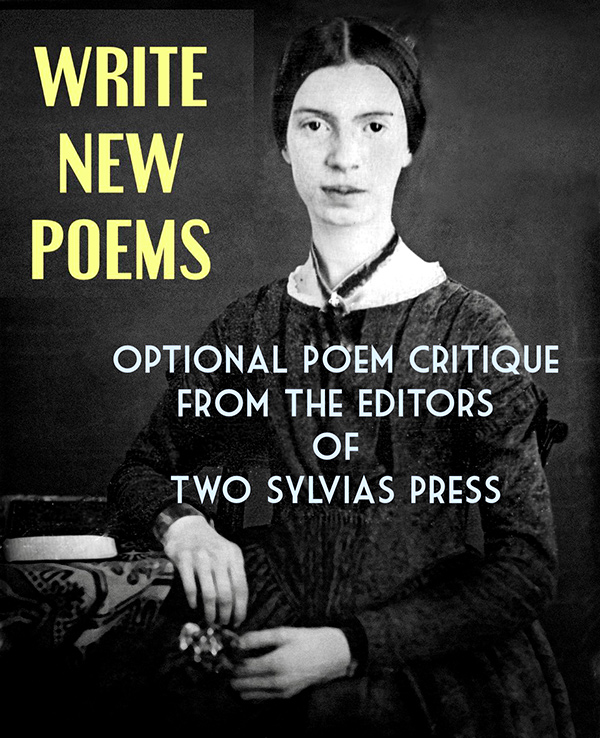
Back by popular demand!
Celebrate National Poetry Month with 30 NEW prompts delivered directly to your inbox each day in April!
Write 30 new poems for NaPoWriMo!
Also available: a CRITIQUE of one of your poems by the Editors of Two Sylvias Press! (Space is limited.)
Sign up today to receive a prompt each day in April!
We also have a limited number of poem critiques available from Kelli Russell Agodon and Annette Spaulding-Convy, the editors of Two Sylvias Press. Receive personalized and detailed feedback for a modest added cost.
Learn more & sign up here.
|

Deadline: April 15
Now in its 26th year, all Dancing Poetry Festival prize winners will receive a prize certificate suitable for framing, a ticket to the 2019 Dancing Poetry Festival at the John A. and Cynthia Fry Gunn Theater at the Palace of the Legion of Honor Museum, San Francisco, and an invitation to read their prizewinning poem at the festival.
Three Grand Prizes will receive $100 each plus their poems will be danced and filmed. Many smaller prizes. Each Grand Prize winner will be invited onstage for photo ops with the dancers and a bow in the limelight.
Please look at photos of our Dancing Poetry Festivals to see the vast diversity of poetry and dance we present each year. For poetry, we look for something new and different including new twists to old themes, different looks at common situations, and innovative concepts for dynamic, thought-provoking entertainment. We look forward to reading your submissions. See the complete contest rules and please enjoy "Two Braids: A Sestina" by
Lorraine Walker Williams, winner of a Grand Prize in 2018.
|
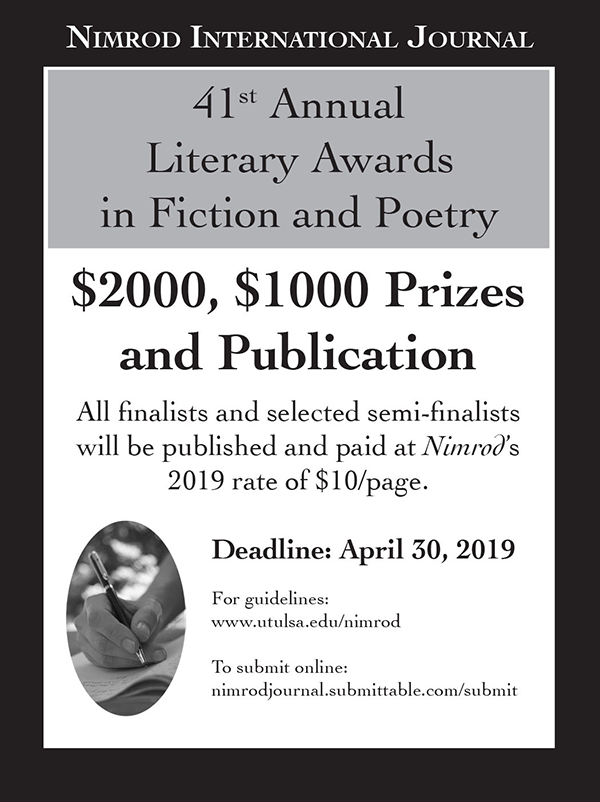
Deadline: April 30
The 41st annual Nimrod Literary Awards—The Pablo Neruda Prize for Poetry and The Katherine Anne Porter Prize for Fiction—are open. The Awards offer first prizes of $2,000 and publication and second prizes of $1,000 and publication. Winners will be brought to Tulsa in October for the Awards Ceremony and Conference for Readers and Writers. All finalists and semi-finalists will be considered for publication, and those published will be paid $10 per page. The final judges for 2019 are Kim Addonizio (poetry) and Margot Livesey (fiction).
Guidelines:
-
Poetry: 3-10 pages
-
Fiction: 7,500 words maximum
-
Fee Per Entry: $20 payable to Nimrod, includes a one-year subscription
No previously published works or works accepted for publication elsewhere. Author's name must not appear on the manuscript. Include a cover sheet containing major title(s), author's name, full address, phone, and email. Entries may be mailed to Nimrod or submitted online via Submittable.
For complete rules, please visit Nimrod's website.
|
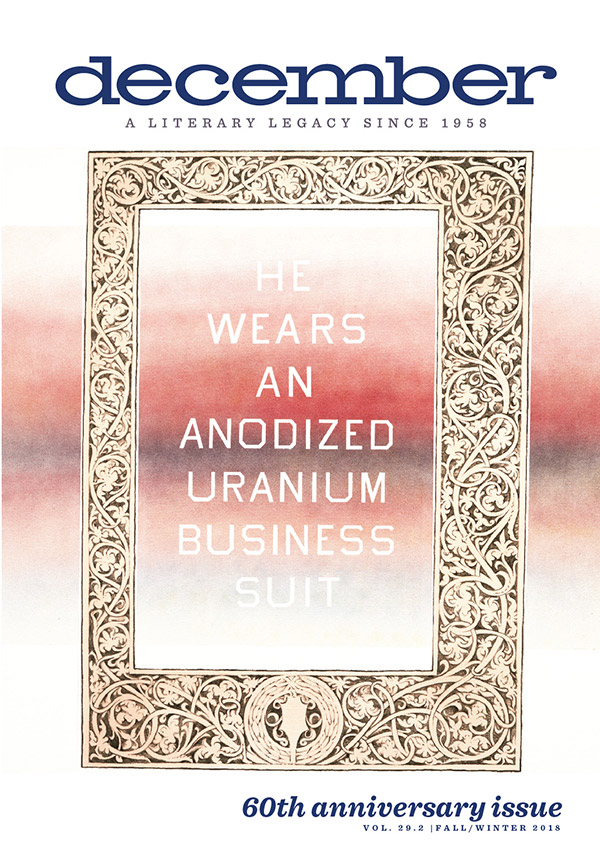
Deadline: May 1
DECEMBER MAGAZINE seeks submissions for our 2019 Curt Johnson Prose Awards in fiction and creative nonfiction. Judges — Rita Mae Brown (fiction) and Amy Chua (nonfiction). Prizes each genre — $1,500 & publication (winner); $500 & publication (honorable mention). All finalists will be listed in the 2019 Fall/Winter awards issue. $20 entry fee includes a copy of the awards issue. All submissions considered for publication. Submit one story or
essay up to 8,000 words. For complete guidelines and judge information, please visit our website.
|
Deadline: May 13
Creative Nonfiction is currently seeking experimental nonfiction for the "Exploring the Boundaries" section ("experimental", "boundaries"...yes, we know these can be loaded terms). We're looking for writing that is ambitious, pushes against the conventional boundaries of the genre, plays with style and form, and makes its own rules. As always, we have only one absolute rule: nonfiction must be based in fact.
Please note that this is NOT a call for an entire "Exploring the Boundaries" issue of the magazine; accepted pieces will be published one per issue, and earliest possible publication will be in Issue #72 (Fall 2019). 4,500 word maximum.
See our complete guidelines.
|
|

|
Deadline: June 10
Creative Nonfiction is looking for new work about power. For this issue, we are seeking true stories that explore the dynamics within groups and systems, however big or small—for example, family units, schools, sports, churches, and government.
We're interested in everything from the murky world of politics to the power games we all occasionally play. Share your stories about power lunches, power grabs, power suits, powerlifting, people power (and/or power to the people), or will power. Tell us about a time when you (or someone else) had power, or a time when you didn't, or tell us about your secret superpower.
Above all, we are seeking vivid narratives, sourced from true events, that demonstrate strong storytelling, voice, and grasp of detail.
Essays must be previously unpublished and no longer than 4,000 words. All essays must tell true stories and be factually accurate. Everything we publish goes through a rigorous fact-checking process, and editors may ask for sources and citations.
See our complete guidelines.
|
|

|
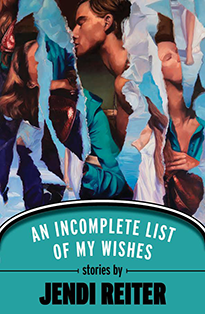
Jendi Reiter's debut story collection An Incomplete List of My Wishes (Sunshot Press, 2018) was featured in British fiction writer and literary critic Jack Messenger's newsletter and website as a winner of his "Best Book Review Award". From the review:
"There is huge variety here, much of which challenges conventional expectations. 'Exodus', for instance, the ironically entitled opening piece, is just over a page long, and is a reflection of sorts on loss and grief, of precious lives gone forever. Jendi Reiter is also a poet, and their prose here possesses a poetic concision and allusiveness of language and image that convey more genuine feeling than many novels manage in a hundred pages. Its emotional resonances are held in deft details and small, often-overlooked words such as 'polite' and 'sorry', washed away in blurred ink. 'Waiting for the Train to Fort Devens, June 17, 1943', a later story, takes a similar approach to confront death and forgetting, the silence of men who have seen terrible things, and our compulsion to tell stories, to make sense of that which eludes reclamation.
"Amid all its differences of theme and technique, An Incomplete List of My Wishes is held together by an insistent, unsentimental claim on our empathetic understanding...Whoever we are, we can still be invited to cherish love and kindness whatever form they take, to sorrow for mistakes and injustices, to value people whose choice is for life, to enjoy the art of the short story at its most sublime."
Read Jack Messenger's interview with Jendi.
Buy An Incomplete List of My Wishes now for $1.99 on Kindle.
If you missed Carol Smallwood's recent interview with Jendi at The Bookends Review, it has been reprinted in Compulsive Reader.
|
|
Some contests are best suited to writers at the early stages of their careers. Others are better for writers with numerous prizes and publications to their credit. Here is this month's selection of Spotlight Contests for your consideration:
Emerging Writers
Restless Books Prize for New Immigrant Writing. $10,000 advance and publication in print and e-book editions for a manuscript of literary prose. This year a sample of nonfiction is sought, 25,000 words minimum, by a first-generation immigrant of their country who has not previously published a book in that particular genre in English. Nonfiction submissions can take the form of a memoir, a collection of essays, or a book-length work of narrative nonfiction. Due March 31.
Intermediate Writers
James Laughlin Award. The Academy of American Poets will award $5,000 for a US poet's second book of 48-100 pages in length, under contract to a US publisher and forthcoming in 2020. The Academy will also buy 1,000 copies of the winning book for distribution to its members and provide the winner with a weeklong residency in Miami Beach, FL. Publisher should submit four copies of manuscript or page proofs (no bound books or galleys) with author's name removed and entry form. Due May 15.
Advanced Writers
Harold U. Ribalow Prize. Hadassah, the women's Zionist organization of America, will award $1,500 for a published book of fiction on Jewish themes. Submit one digital copy and four print copies of an English-language novel or collection of short stories published in the previous calendar year. Early entries strongly encouraged. Due April 12.
See more Spotlight Contests for emerging, intermediate, and advanced writers within The Best Free Literary Contests database.
|
|

|

ProLiteracy, the leader in adult literacy content development, programs, and advocacy for more than 60 years, partnered with Voxy, a personalized language learning platform, to educate and create opportunities for immigrants, refugees, and other non-native English speakers who do not have the literacy skills necessary to achieve economic security.
The partnership is designed to address the nation's growing literacy crisis by expanding access to Voxy's online language instruction into underserved, low-literate communities, which often struggle with long student waiting lists and a lack of instruction tailored to their unique needs. Available 24/7 across all devices, Voxy's personalized curriculum adapts to each learner's language level, learning goals, and areas of interest, which is a particularly effective approach for emerging readers, who cannot read in English or their native language.
"Health. Gender equality. Poverty. Every important social issue is impacted by low literacy. When individuals learn how to read, write, and use computers, they have the power to lift themselves out of poverty, lower health care costs, find and keep sustainable employment, and ultimately change their lives," said Kevin Morgan, President and CEO of ProLiteracy. "We are excited to partner with Voxy to bring this unique personalized digital English solution to our network of over 500,000 adult literacy learners. We believe that this is the optimal tool to offer digital English language instruction."
"Our partnership with ProLiteracy will support more non-native speakers with tactical, needs-based instruction," said Katie Nielson, Chief Education Officer of Voxy. "By offering authentic content and English language instruction that is aligned with the specific needs of emerging readers, we will be able to improve economic outcomes for this historically underserved population."
Learn more about how Voxy can help build English language skills.
|
Award-Winning Fiction and Nonfiction from Around the Web
This month, editor Jendi Reiter highlights fiction and nonfiction that have won recent prizes.
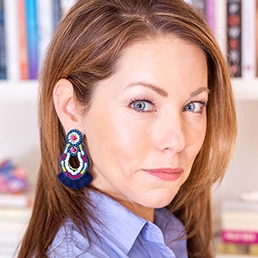
FOUR HUNDRED RINGS
by Courtney Marcelo Norton
Third Prize Winner of Narrative Magazine's Fall 2018 Story Contest
Entries must be received by March 31
Narrative, a well-regarded online journal, gives quarterly prizes up to $2,500 for unpublished short fiction and essays. The Winter 2019 Story Contest is open through March 31. This unflinching story set in Natchez during the Civil War reveals the sacrifices and strengths of black mothers under slavery.
EPIPHANY ON THE E TRAIN
by Alyssa Metcalfe
Winner of the 2017 Gemini Magazine Short Story Award
Postmark Deadline: April 1
This long-running award with an affordable entry fee gives prizes up to $5,000 and publication in the online journal. In this story structured as an interior monologue, an abusive intimate relationship takes a surprising turn.
BEGINNING
by Claire Wahmanholm
Winner of the 2017 New Michigan Press/DIAGRAM Chapbook Contest
Entries must be received by April 27
DIAGRAM, an experimental online journal, gives $1,000 and publication by New Michigan Press for a chapbook of poetry, prose, or hybrid-genre work. Wahmanholm's Night Vision won the 2017 award. This prose-poem from Issue 18.1 is an abecedarian (each line beginning with a successive letter of the alphabet) in which the mysterious advance of the apocalypse seems inevitable as the progression from A to Z.
BLANKING
by Kristin Kostick
Winner of the Summer 2018 New Millennium Writings Award for Nonfiction
Entries must be received by June 23
Offered since 1996, this twice-yearly award series from a prestigious magazine gives $1,000 prizes for poetry, fiction, flash fiction, and creative nonfiction. Kostick's haunting essay pivots around the question of whether her grandfather's disease-related memory loss is a blessing or an evasion of his traumatic role in the family.
|
We send this newsletter to over 50,000 subscribers. Ads are just $150 each. On a tight budget? Pressed for time? Advertise to our 115,000 Twitter followers for just $40 per tweet or less.

Solo mailings and website advertising are available. Inquire with Adam Cohen at adam@winningwriters.com.
|
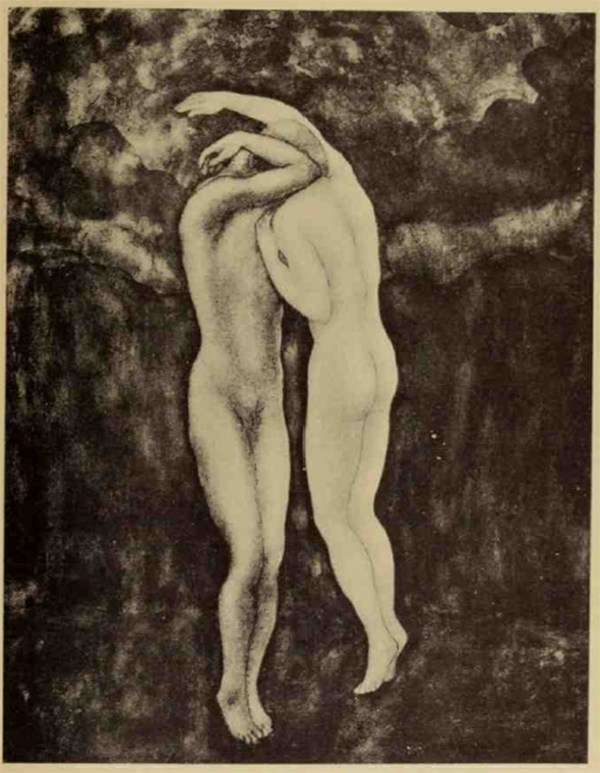
The Prophet by Kahlil Gibran recently entered the public domain. We'll publish several excerpts from this classic work over the coming months. Here is the first excerpt. Above is an illustration by the author.
Then said Almitra, Speak to us of Love.
And he raised his head and looked upon the people, and there fell a stillness upon them. And with a great voice he said:
When love beckons to you follow him,
Though his ways are hard and steep.
And when his wings enfold you yield to him,
Though the sword hidden among his pinions may wound you.
And when he speaks to you believe in him,
Though his voice may shatter your dreams as the north wind lays waste the garden.
For even as love crowns you so shall he crucify you. Even as he is for your growth so is he for your pruning.
Even as he ascends to your height and caresses your tenderest branches that quiver in the sun,
So shall he descend to your roots and shake them in their clinging to the earth.
Like sheaves of corn he gathers you unto himself.
He threshes you to make you naked.
He sifts you to free you from your husks.
He grinds you to whiteness.
He kneads you until you are pliant;
And then he assigns you to his sacred fire, that you may become sacred bread for God's sacred feast.
All these things shall love do unto you that you may know the secrets of your heart, and in that knowledge become a fragment of Life's heart.
But if in your fear you would seek only love's peace and love's pleasure,
Then it is better for you that you cover your nakedness and pass out of love's threshing-floor,
Into the seasonless world where you shall laugh, but not all of your laughter, and weep, but not all of your tears.
Love gives naught but itself and takes naught but from itself.
Love possesses not nor would it be possessed;
For love is sufficient unto love.
When you love you should not say, "God is in my heart," but rather, "I am in the heart of God."
And think not you can direct the course of love, for love, if it finds you worthy, directs your course.
Read The Prophet on Wikisource
|
 Sacred Arts, Imperfect Mediators Sacred Arts, Imperfect Mediators
On social media, there's a predictable cycle of declaring that some creator is "canceled" because of anything from an unfortunate remark to serial predation, followed by a flurry of equally simplistic rants against political correctness. Separating art from artist was the premise of early 20th century New Criticism, which has stuck with us because it makes English-class papers easier to write without historical background. Postmodern "death of the author" theory, meanwhile, can empower readers to reclaim the text from its problematic origins. I see a similarity to the way that progressive Christians claim personal authority to talk back to oppressive Bible passages and carve out a place for marginalized people in the tradition.
[read more]
Jendi Reiter is the editor of Winning Writers.
Follow Jendi on Twitter at @JendiReiter.
|
|

|
|
|
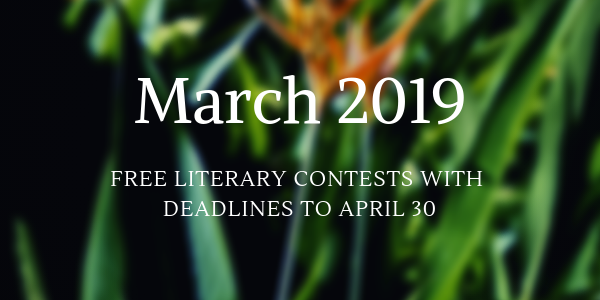
 We found over three dozen quality free poetry and prose contests with deadlines between March 15-April 30. In this issue, please enjoy "Love", an excerpt from The Prophet by Kahlil Gibran.
We found over three dozen quality free poetry and prose contests with deadlines between March 15-April 30. In this issue, please enjoy "Love", an excerpt from The Prophet by Kahlil Gibran.








